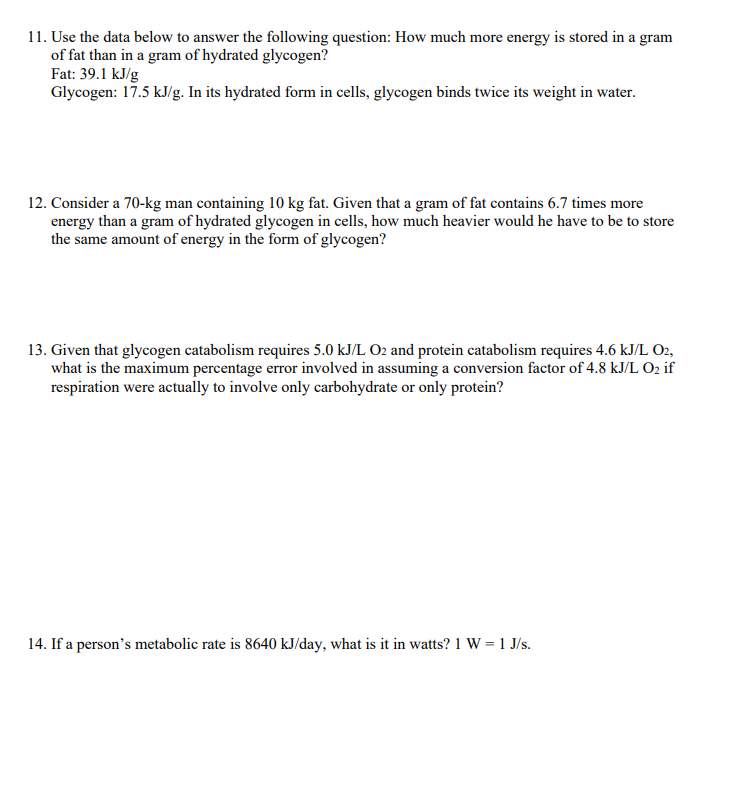11. Use the data below to answer the following question: How much more energy is stored in a gram of fat than in a gram of hydrated glycogen? Fat: 39.1 kJ/g Glycogen: 17.5 kJ/g. In its hydrated form in cells, glycogen binds twice its weight in water. 12. Consider a 70-kg man containing 10 kg fat. Given that a gram of fat contains 6.7 times more energy than a gram of hydrated glycogen in cells, how much heavier would he have to be to store the same amount of energy in the form of glycogen? 13. Given that glycogen catabolism requires 5.0 kJ/L O2 and protein catabolism requires 4.6 kJ/L 02, what is the maximum percentage error involved in assuming a conversion factor of 4.8 kJ/L O₂ if respiration were actually to involve only carbohydrate or only protein? 14. If a person's metabolic rate is 8640 kJ/day, what is it in watts? 1 W = 1 J/s.
11. Use the data below to answer the following question: How much more energy is stored in a gram of fat than in a gram of hydrated glycogen? Fat: 39.1 kJ/g Glycogen: 17.5 kJ/g. In its hydrated form in cells, glycogen binds twice its weight in water. 12. Consider a 70-kg man containing 10 kg fat. Given that a gram of fat contains 6.7 times more energy than a gram of hydrated glycogen in cells, how much heavier would he have to be to store the same amount of energy in the form of glycogen? 13. Given that glycogen catabolism requires 5.0 kJ/L O2 and protein catabolism requires 4.6 kJ/L 02, what is the maximum percentage error involved in assuming a conversion factor of 4.8 kJ/L O₂ if respiration were actually to involve only carbohydrate or only protein? 14. If a person's metabolic rate is 8640 kJ/day, what is it in watts? 1 W = 1 J/s.
Human Physiology: From Cells to Systems (MindTap Course List)
9th Edition
ISBN:9781285866932
Author:Lauralee Sherwood
Publisher:Lauralee Sherwood
Chapter2: Cell Physiology
Section: Chapter Questions
Problem 2SQE
Related questions
Question

Transcribed Image Text:11. Use the data below to answer the following question: How much more energy is stored in a gram
of fat than in a gram of hydrated glycogen?
Fat: 39.1 kJ/g
Glycogen: 17.5 kJ/g. In its hydrated form in cells, glycogen binds twice its weight in water.
12. Consider a 70-kg man containing 10 kg fat. Given that a gram of fat contains 6.7 times more
energy than a gram of hydrated glycogen in cells, how much heavier would he have to be to store
the same amount of energy in the form of glycogen?
13. Given that glycogen catabolism requires 5.0 kJ/L O2 and protein catabolism requires 4.6 kJ/L O2,
what is the maximum percentage error involved in assuming a conversion factor of 4.8 kJ/L O₂ if
respiration were actually to involve only carbohydrate or only protein?
14. If a person's metabolic rate is 8640 kJ/day, what is it in watts? 1 W = 1 J/s.
Expert Solution
This question has been solved!
Explore an expertly crafted, step-by-step solution for a thorough understanding of key concepts.
This is a popular solution!
Trending now
This is a popular solution!
Step by step
Solved in 5 steps

Recommended textbooks for you

Human Physiology: From Cells to Systems (MindTap …
Biology
ISBN:
9781285866932
Author:
Lauralee Sherwood
Publisher:
Cengage Learning

Nutritional Sciences: From Fundamentals to Food, …
Health & Nutrition
ISBN:
9781337486415
Author:
McGuire
Publisher:
Cengage


Human Physiology: From Cells to Systems (MindTap …
Biology
ISBN:
9781285866932
Author:
Lauralee Sherwood
Publisher:
Cengage Learning

Nutritional Sciences: From Fundamentals to Food, …
Health & Nutrition
ISBN:
9781337486415
Author:
McGuire
Publisher:
Cengage


Biology 2e
Biology
ISBN:
9781947172517
Author:
Matthew Douglas, Jung Choi, Mary Ann Clark
Publisher:
OpenStax

Biology: The Dynamic Science (MindTap Course List)
Biology
ISBN:
9781305389892
Author:
Peter J. Russell, Paul E. Hertz, Beverly McMillan
Publisher:
Cengage Learning